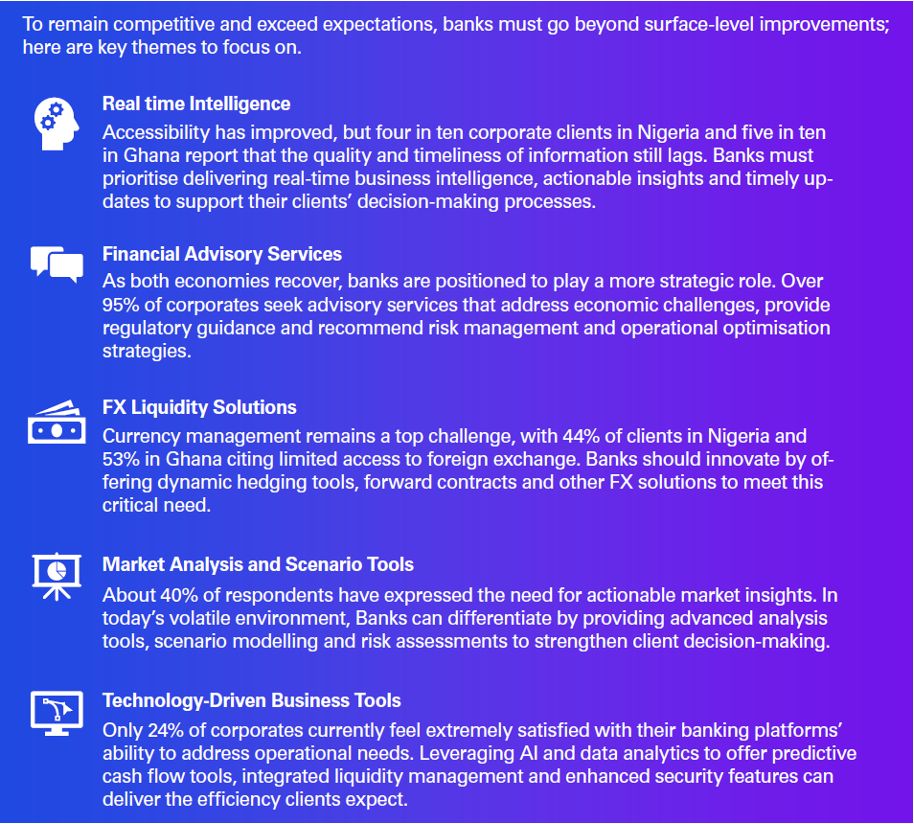Introduction
The following article is the second part of the “Corporate Banking Excellence in an Evolving Landscape”, the third in a series of excerpts from KPMG’s 2024 West Africa Banking Industry Survey Report, highlighting banking customer behaviour and expectations across retail, corporate, and SME industry segments.
This year’s customer experience leaders have set a benchmark in critical areas, particularly through robust relationship management and innovative partnerships that meet the evolving needs of their corporate clients. Nonetheless, there remain ample opportunities for growth and innovation.
Feedback from over 700 corporates across Nigeria and Ghana highlights areas where banks can consolidate gains and further elevate their service offerings. As the digital transformation continues to reshape the industry, the corporate segment demands more proactive and strategic responses. The reliability of digital platforms emerged as a pivotal priority this year, ranking higher on client importance across both Nigeria and Ghana. While banks have made strides in launching digital solutions, persistent issues – such as downtimes, transaction delays, inadequate relationship manager accessibility and slow response to queries – reinforce the need for better integrated and customer-focused approaches.
As banks begin overhauling their core banking systems to address these reliability gaps and meet increasing digital demands, significant improvements in service delivery are anticipated. These changes are expected to align more closely with the evolving needs of clients in an increasingly digital-first world. For banks lagging in digital capabilities, simply launching new platforms will not suffice. They must focus on designing seamless customer journeys that proactively address pain points specific to corporate clients. Additionally, aligning internal processes to support these journeys is crucial to delivering the target customer experience and building trust in their digital offerings.
Across Nigeria and Ghana, most banks’ performance lagged in the personalisation pillar. This was largely due to customers’ inability to access loans and a lack of dialogue with customers from some banks altogether. In this year’s survey, the willingness of banks to offer customised services ranked low in customer satisfaction.

While global trade in Africa contracted by 6.3% in 2023, intra-African trade showed more resilience expanding by 3.2% in the same period. We expect that the African Continental Free Trade Area (AfCFTA) will begin to fulfil its potential to reduce trade barriers, increase economic integration, develop regional value chains, and drive the innovation of trade-enabling infrastructure.
These trade dynamics and recent market developments have renewed the urgency for intra-African expansion. Companies across the sub-region see trade as an area with significant potential and are increasingly looking to capitalise on the emerging opportunities to compete. Their success, however, depends significantly on the support provided by financial institutions.
Ninety percent of corporates surveyed this year highlighted the importance of trade finance to their business. While the market is currently dominated by traditional products e.g. letters of credit and confirmations, the landscape is shifting as there is now a growing demand for alternative offerings such as supply chain finance and structured trade finance products, driven by increased interest in commodity trading and exports. This is affirmed by feedback from corporates emphasising the need for banks to broaden their trade finance services and extend coverage to more countries and currencies.
Despite these clear opportunities, accessing trade finance remains a challenge for both SMEs and large corporates in Nigeria and Ghana where the annual trade finance gap is estimated at $7 billion and $3 billion respectively.
An International Finance Corporation (IFC) survey of financial institutions in West Africa found that trade finance only supports one in four goods traded – an indication of the limited coverage being offered by banks. The survey estimates that up to 21% of trade finance applications are rejected by banks in the region.

